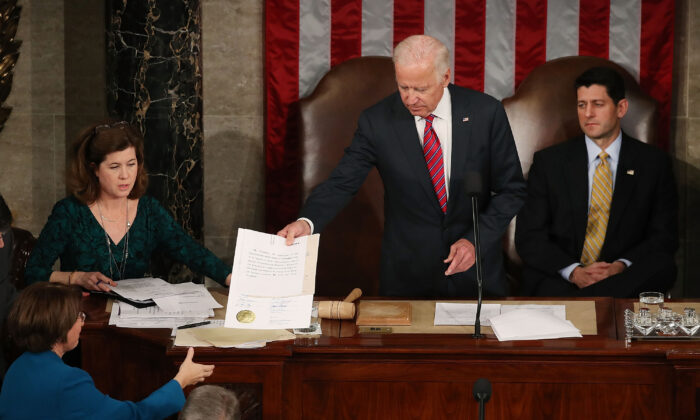Via Clint

That will trigger a withdrawal from the joint session and a two-hour debate followed by votes in each chamber. Only with a majority vote from both the House and the Senate would a challenge be upheld, which even supporters find unlikely, considering that Democrats, who control the House, and Senate Republican leadership, including McConnell, have expressed disapproval of the plan to object.
The House of Representatives and the Senate on Jan. 3 adopted rules that outline how the counting of Electoral College votes will take place on Jan. 6.
The rules were passed without recorded votes. Instead, a voice vote was used in both chambers.
The guidance, introduced by Senate Majority Leader Mitch McConnell (R-Ky.), says the chambers will meet in a joint session on Jan. 6 presided over by Vice President Mike Pence.
Pence, as president of the Senate, will open “all the certificates and papers purporting to be certificates of the electoral votes,” the rules state, a nod to the fact that seven states sent so-called competing electors to Washington, certificates for both Democratic presidential nominee Joe Biden and President Donald Trump.
More @ The Epoch Times

Congress doesnt have anything to do with it. The Constitution spells it out very plainly.
ReplyDeleteThanks and just checked it out.
Delete“Objections to individual state returns must be made in writing by at least one Member each of the Senate and House of Representatives. If an objection meets these requirements, the joint session recesses and the two houses separate and debate the question in their respective chambers for a maximum of two hours,” the CRS said. “The two houses then vote separately to accept or reject the objection. They then reassemble in joint session, and announce the results of their respective votes. An objection to a state’s electoral vote must be approved by both houses in order for any contested votes to be excluded.”
https://constitutioncenter.org/blog/explaining-how-congress-settles-electoral-college-disputes